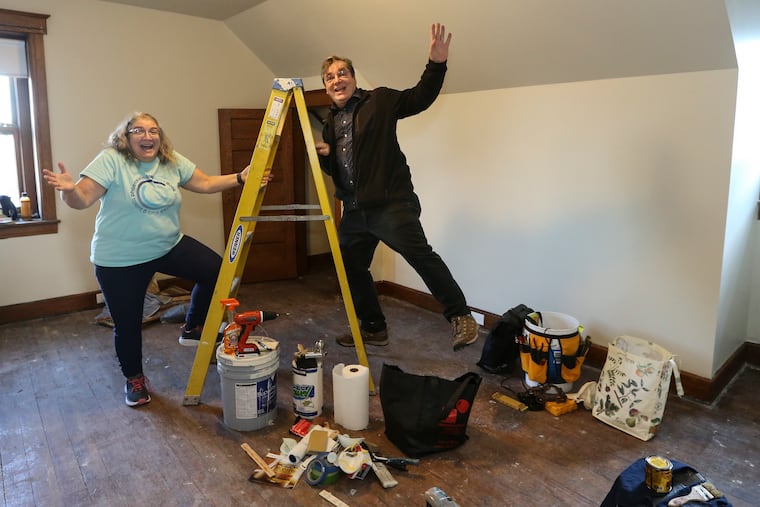Time is money at this Phoenixville ‘bank’
For the first time, the nonprofit Phoenixville Area Time Bank will have its own office.

The lock for the door is not yet in place, nor has the new carpet been installed. But the tiny room on the third floor of an old stone building on the grounds of the Phoenixville Hospital will soon be home to a group with a big mission.
For the first time, volunteers with the nonprofit Phoenixville Area Time Bank will have their own office. They’ll rent the space for $1 a month from the hospital and share a common area with other nonprofits from the area.
“This is huge for us,” said Diana Baldi, the group’s president. The move from the home of a volunteer to a public space will raise the group’s visibility in the community and improve accessibility to all. The group plans to open in late February.
A time bank, for the uninitiated, is an organization whose volunteers can both “deposit” their own time to others’ tasks or projects and, when they themselves need assistance, “withdraw” the time of others.
The Phoenixville Area Time Bank, one of several in the region, is celebrating its 16th year. In 2004, seven organizers and a part-time paid coordinator launched the group, known then as the Valley Forge Time Bank. They were inspired by TimeBankUSA founder Edgar Cahn, who created the organization as a way to recognize that everyone has value, to foster stronger communities, and to reward civic engagement through a pay-it-forward approach to volunteerism.
More than 80 Time Banks in are registered in the United States, including nine in Pennsylvania and three in New Jersey. Six other countries — Australia, Canada, France, Guatemala, New Zealand, and South Korea — also have time banks, though not all of the groups are active and some only have a few members.
» READ MORE: ‘We have your brother’: Woman connects with the sibling she thought had died at birth
The Phoenixville Area Time Bank appears to be one of the most dynamic: In 2018, its 750 members exchanged 1,708 hours for help with home tasks, business ventures, community services, and more. Another 1,581 hours were contributed.
Members earn time hours by performing tasks with or for other members: hemming a pair of pants, feeding a cat, setting up a computer, baking cookies, weeding a garden, painting a room. There is no direct person-to-person payback — anyone from the group can step forward to help. Everyone’s activity is logged into a software program that tracks the exchanges and hours.
“A lot of times people will volunteer but won’t want something back,” said Baldi. One of the group’s challenges is to help members feel comfortable enough to ask for help when they need it. To nurture interpersonal connections, the time bank hosts regular social events.
“People are not going to naturally trust other people unless they’ve met them," Baldi said.
Margo Ketchum, along with her husband, Joel Bartlett, is one of the founding members of the Phoenixville Area Time Bank and is still involved.
“I have had a wonderful experience, exchanging with many people,” she said. Those exchanges have included dog-sitting, rides to the airport, and help with graphic design.
One of her favorite exchanges, though, occurred between herself and Carla Schaeffer, an artist and volunteer in the time bank. Ketchum owned an old, beyond-repair violin that her grandfather had made. She also owned some old, beloved teacups. She asked Schaeffer to do something artistic with the items.
Schaeffer envisioned using pieces of the teacups to decorate the violin. The result took Ketchum’s breath away.
“She made these unbelievable decorations on the face of the violin,” said Ketchum. 'It’s the most beautiful piece of art you can imagine."
The Phoenixville Time Bank has some restrictions. New members must attend an orientation meeting to learn about the bank’s core values and software. And certain medical or home-healthcare tasks are prohibited, such as dispensing prescription medications or giving someone a bath. Members must also assume the cost of materials needed for tasks: ingredients for the cookies they need baked, for example, or materials for a paint job.
Nor is time-banking an opportunity to score professional services for free, said Baldi. Most people who work full-time in a labor profession, like plumbing, don’t usually offer their services via the time bank.
While there’s no guarantee for the quality of the work that’s rendered, most members have been satisfied and were happy to have been helped.
“We are just individuals doing the best we can,” said Baldi.
One of the time bank’s more unusual exchanges is with a nonprofit called Days for Girls, an international group that sews and distributes washable, sustainable feminine hygiene products to girls in 125 counties who might otherwise miss school during their monthly menstrual periods.
The bank also partners with area nonprofit organizations, including Orion Communities, which helps those living in poverty, Parkhouse Rehabilitation Center and Nursing home, and Ann’s Heart, a charity that identifies gaps in existing services to help community residents in need.
In 2018, the group helped another area time bank, Good Neighbors Time Bank, get off the ground. Good Neighbors operates as a subsidiary of KenCrest, a nonprofit serving people with intellectual disabilities. Its volunteers are focused on growing their membership in Berks, Bucks, Chester, Delaware, Montgomery, and Philadelphia Counties.
“It takes a long time to cultivate a time bank,” said Lauren Tilghman, spokesperson for KenCrest, which received a grant to launch Good Neighbors.
Some of its exchanges have included resume help, car repairs, jewelry-making, and knitting circles, Tilghman said. Members with disabilities have been able to become involved with tasks like stuffing bags or creating artwork.
“It’s really a great community of support, for anyone,” she said.